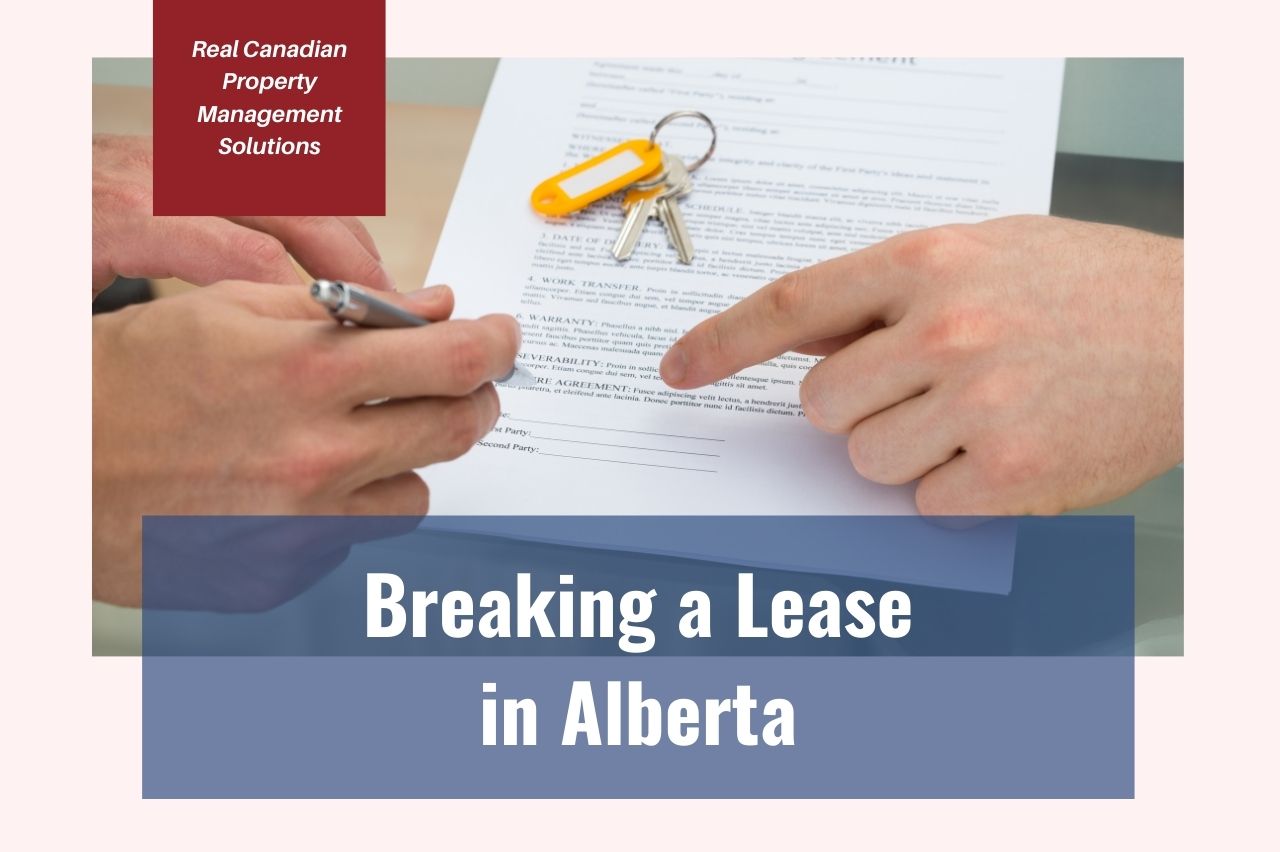
Each province has a different law when it comes to lease-breaking. This article tackles breaking a lease early in Alberta, Canada, and more specifically, in Grande Prairie.
While both landlords and tenants want to avoid exiting a signed lease early, certain situations occur that make this impossible. RCPM has gathered some important information for both tenants and landlords alike.
It’s important to have a grasp of the landlord-tenant law under Alberta law, regarding leases if you have (or plan to purchase) a rental property investment in Grand Prairie.
Key Info on Breaking a Lease Early in Alberta
Grounds for Lease Agreement Termination
A tenant or landlord might find that they can’t hold their end of the leasing bargain. You may find yourself asking: Can a tenant end a lease early? Or, if you’re a landlord, can an owner break a lease? The answer to both is yes.
Tenants may be wondering how to break a lease legally. Luckily for landlords, there are only very specific legal grounds for breaking a lease agreement in Alberta:
- Breached agreement: When either the landlord or tenant does not honour a lease, this can be a legal cause to terminate.
- Tenant is moving: Some provinces don’t classify finding a new place to live as a justifiable cause for terminating a lease. But in Alberta, Canada, this is an acceptable reason for ending a tenancy agreement.
- Landlord terminates the lease: A landlord can decide to terminate tenancy for a specific reason, so long as proper notice is given.
Seek out a professional to provide legal advice.

Fixed-Term Lease Termination
This one is easy, as the termination date is specifically agreed upon in the lease. There’s no need to provide notification of early termination of tenancy in this case. However, it’s courteous to provide a reminder to your tenant before the agreement expires.
Periodic-Term Lease Termination
Landlords retain the right to end a periodic tenancy. This can happen when a landlord or his relative wishes to live in the rental.
Another reason would be if the landlord plans to sell the rental property, and the new owner will be moving in. In this case, the tenant cannot continue living in the rental premises. The new owner must also request the landlord to provide proper notice to the tenant for the end of a tenancy.
In another situation, tenants would have to leave if the landlord wanted to convert the rental home into a non-residential unit. If major renovations are in order and the rental premises need to be vacated (for example, if the landlord is converting it into a condo unit), then the tenant needs to be informed first.
Notification of early termination of a lease agreement, in this case, should be given about a year in advance. If the property job only entails repainting, changing the floor coverings or going through routine maintenance, this doesn’t fall in the ‘major renovations’ category. This is not considered a valid reason for breaking a lease in Alberta.

How to Break a Lease in Alberta
Fixed-Term Tenancy
As previously mentioned, there’s no required notice for a fixed-term tenancy, since the end date is already specified in the rental agreement. Continuing the lease or rental agreement after the end of the term is up to both the landlord and the tenant.
Periodic Tenancy
In contrast to a fixed-term tenancy, there must be a writtel notice provided by the landlord to the tenant (or vice-versa) if they wish to end the leasing agreement. Here are details that must be included in the written notice to end tenancy:
- The rental unit address must be stated.
- The end of the tenancy date must be specified.
- The notification must include the signature of either the landlord or tenant who provided the notice.
- If you’re the landlord, you are required to outline the reasons why you wish to end the periodic lease.
Serving Period of a Notice to End Tenancy
What notification is required for terminating tenancy in Alberta? It depends on the party providing the notice. It also depends on the type of tenancy. Here are the periods to watch out for:
Week-to-week Tenancy
Notification of one week is considered adequate for both the tenant and the landlord.
Month-to-month Tenancy
If you’re the landlord, you’re required to provide 3 months’ notice to the tenant. A person only needs to provide a one-month notice to end tenancy.

When to Serve a Notice
Notice for Ending a Week-to-week Tenancy
It’s required to give the notice on or before the first day of the weekly tenancy. The lease agreement will then end on the last day of the week.
Notice for Ending a Month-to-month Tenancy
Tenants must give the notification on or before the first day of the monthly tenancy. After this, the lease or rental agreement will end on the last day of the month. Landlords are required to give notification on or before the first day of the 3-month notice period.
On legal holidays, the due date will be moved to the following business day. For example, if the notification date occurs on September 7, that’s Labour Day. The due date is thus moved to September 8.
What Happens When A Rental Termination Notice Is Served Late?
You want to avoid serving a late notification when breaking a lease in Alberta. If this happens, the effective date will also be moved. So, if you plan to sell your property or have your relatives use it, this will only happen at a later date.
Week-to-week Tenancy
If you serve the rental termination notice late to your tenant, then the lease agreement end date will instead be on the last day of the following week.
Month-to-month Tenancy
This type of arrangement follows the same procedure as a week-to-week tenancy. If you serve the notice late to a tenant, then the end of the tenancy date will be on the last day of the next month.

Serving the Move-Out Notice
There are 2 ways to properly serve notice to end tenancy when breaking a lease in Alberta:
- In person.
- By registered mail. The person must use the mailing address given in the ‘notice of landlord’. As for landlords, they should use the mailing address of the rental property when sending a tenancy termination letter.
If the tenant cannot be found in the rental unit or if they’re displaying evasive behaviour, the landlord can opt to give the notice to another adult living with the tenant. The landlord can also post the notice in a visible area of the rental premises to ensure that the tenant will not miss the information.
When giving a tenant notice to vacate cannot be done via the two methods above, it is possible to send the notice electronically. The recipient of the notice must be able to print a copy. After confirmation you can start seeking a replacement tenant.